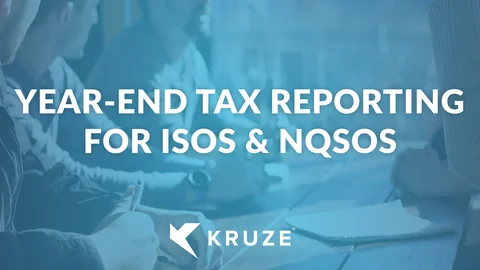
As December and January roll around each year, one of the most common questions we hear from founders is: “What do I need to do about all the employees and contractors who’ve received stock options?” If your startup has granted Incentive Stock Options (ISOs) or Non-Qualified Stock Options (NQSOs), there are important tax reporting requirements you need to meet – quickly.
Here’s a straightforward guide to help you stay compliant and avoid headaches as you close out the year.
Types of Stock Options and Their Reporting Requirements
There are two main types of stock options your startup may have granted:
- Incentive Stock Options (ISOs)
- Non-Qualified Stock Options (NQSOs)
Let’s break down what you need to do for each.
Incentive Stock Options (ISOs)
Incentive Stock Options (ISOs) are a form of equity compensation granted exclusively to employees, giving them the right to purchase company stock at a predetermined price, known as the exercise or strike price, after a specified vesting period. ISOs are particularly attractive due to their favorable tax treatment: employees do not pay ordinary income tax when they exercise the options, provided certain holding requirements are met – specifically, the shares must be held for at least one year after exercise and two years after the grant date. If these conditions are satisfied, any profit made upon selling the shares is taxed at the long-term capital gains rate, which is typically lower than ordinary income tax rates. However, ISOs are subject to specific restrictions, such as being available only to employees and having a $100,000 annual limit on the value of options that can become exercisable for the first time in any calendar year.
Summary:
- Who can receive ISOs? Only employees.
- What form do you need? IRS Form 3921
- How do you file? Your accountant can handle this for you, or you can use specialized equity management platforms like Carta.
Action item:
If you’ve granted ISOs to employees, make sure you file Form 3921 for each employee who exercised options during the year. This form must be delivered to the employee and filed with the IRS by January 31st.
Non-Qualified Stock Options (NQSOs)
Non-Qualified Stock Options (NSOs), by contrast, are a more flexible form of stock option that can be granted to employees, contractors, advisors, and board members. NSOs do not qualify for the special tax advantages of ISOs. When an NSO is exercised, the difference between the exercise price and the fair market value at exercise (the “spread”) is treated as ordinary income and is subject to income and payroll taxes at the time of exercise. This amount is reported as compensation on the recipient’s W-2 or 1099 form, depending on their employment status. Any subsequent gain or loss, realized when the shares are eventually sold, is taxed as a capital gain or loss, with the rate depending on the holding period after exercise. NSOs are generally simpler to administer and can be granted by a wider variety of entities, making them especially popular among startups and companies seeking to compensate non-employees.
Summary:
- Who can receive them? Employees and contractors.
For employees:
- Reporting method: Adjust their W-2, Box 12.
- How do you file? Work with your payroll provider to ensure the W-2 reflects the appropriate income from NQSO exercises.
Action item:
Coordinate with your payroll provider to update employee W-2s before the January 31st deadline.
For contractors:
- Reporting method: IRS Form 1099-MISC
- How do you file? Issue a 1099-MISC to each contractor who exercised NQSOs, reporting the income accordingly.
Action item:
Prepare and send Form 1099-MISC to all relevant contractors by January 31st.
Summary Checklist
- ISOs (employees only): File IRS Form 3921.
- NQSOs (employees): Update W-2, Box 12 via your payroll provider.
- NQSOs (contractors): File IRS Form 1099-MISC.
Need Help?
Don’t let year-end reporting catch you off guard. Kruze Consulting specializes in helping venture-funded startups navigate the complex requirements of equity compensation. If you have questions or need support, reach out to our team – we’re here to help you stay compliant and focused on growth. Stay ahead of your deadlines, keep your team happy, and set your startup up for success in the new year!











